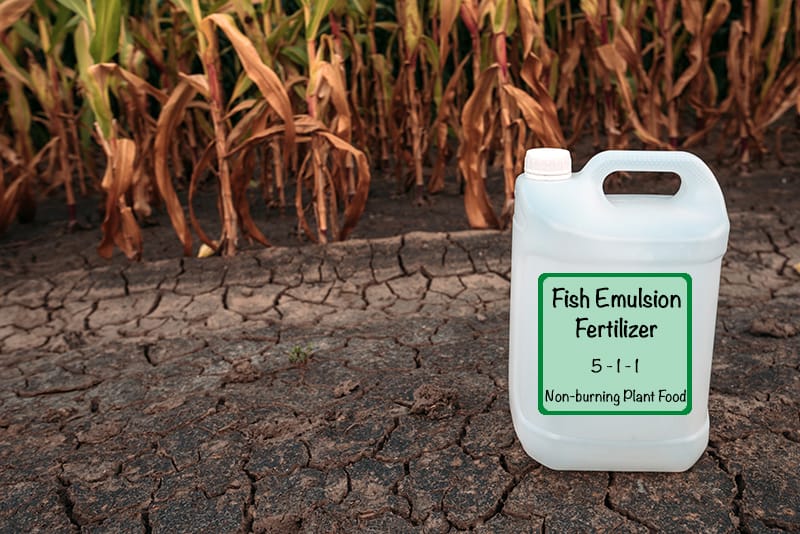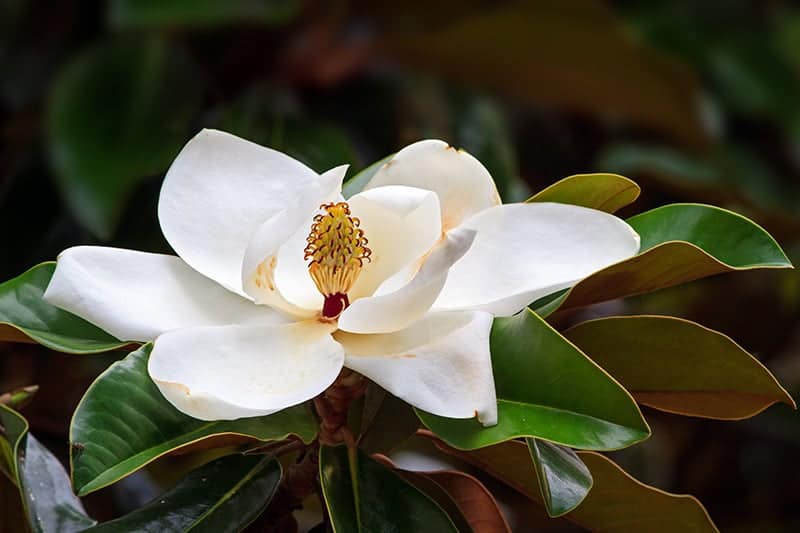window.adthrive.cmd.push(function() { window.adthrive.disableAds(); }); ... Read More
- Home >
- Fish Emulsion Fertilizer – How to Use Fish Emulsion On Plants
Fish Emulsion Fertilizer – How to Use Fish Emulsion On Plants

If you’ve gone to the effort to select plants and carefully home them in your garden, then you’re going to want to ensure they are cared for in the best way so that they thrive and reward you with lush growth and abundant blooms.
One of the key ways to help your plants succeed is to ensure they get the nutrients they need, and this typically means feeding them with fertilizer because nutrients in soil become depleted over time, and do not always contain all of the vitamins and minerals that a plant requires.
While you are probably aware that you need to be fertilizing your plants, you may be less sure of which fertilizer would be the best option. There are so many choices of fertilizer available today that it can be overwhelming to decide which one to go with. Fish emulsion fertilizer is one option, but what actually is fish fertilizer, what are its benefits, and how do you use it? Read on to discover everything the home gardener needs to know about this organic fertilizer.
What Is Fish Emulsion Fertilizer?
Fish emulsion fertilizer is a type of organic fertilizer produced for use on garden plants and vegetables. It is made from byproducts of the fish industry, with a typical nutrient ratio of 5-2-2 or 5-1-1, meaning it is high in nitrogen and, therefore, particularly beneficial for green leafy plants, and lawns. It can be used as either a foliar spray or a soil drench and can be purchased from stores, or you can make your own at home.
What Is Fish Emulsion Fertilizer Made Of?
Fish emulsion fertilizer is made from byproducts of the fishing industry, including fish meal and fish oil. Fish emulsion fertilizer, which has been manufactured for use in gardens, will typically contain the fish scraps that have no other use, such as fish bones, fishtails, and fish guts. This makes it a good sustainable choice of fertilizer, as it utilizes organic materials that would otherwise be wasted.
However, many argue that homemade fish emulsion fertilizer is more beneficial for plants, as it contains bacterial microorganisms that are lacking in commercial fish emulsion fertilizer. These microorganisms help to improve soil quality, and can also protect against disease. Homemade fish emulsion fertilizer is super easy to make and usually works out less costly than buying pre-made fish emulsion fertilizer. The biggest drawback is the smell, but many gardeners believe putting up with the smell is worth it for the end product.
If you are interested in producing your own homemade batch of fish emulsion fertilizer, you will need a large container, fresh fish, sawdust, and some unsulfured molasses. You could approach your fishmonger and ask for fish scraps, as this will probably be cheaper than buying whole fish, though these are also perfectly adequate to use. Some people use raw fish while others used cooked, but there is no advantage to cooking the fish, so this isn’t a requirement.
Use around one part fish to three parts sawdust, and mix together in your container along with the bottle of unsulfured molasses. You may also need to add a little water to loosen the mixture up. Tightly secure a lid on the container to help the smell from seeping out, and stir the mixture every day for a few weeks to a month. Those living in hotter climates will find that their mixture breaks down more quickly. Over this time, the mixture will break down and become fish emulsion fertilizer. You can then use this as you ordinarily would on your plants, diluting it down to around one to three tablespoons of fertilizer to one gallon of water.
Benefits of Fish Emulsion Fertilizer
There are several benefits to using fish emulsion fertilizer over other types of fertilizer, and some will appeal more than others. As we all become more aware of the impact of our decisions on the environment and the future of our beautiful planet, many people are turning to organic options that are more environmentally friendly than chemical options.
Chemical fertilizers can contain toxins, which leach through our soil and into waterways. These chemicals contaminate our environment and cause long-lasting problems for wildlife and nature. Organic fertilizers, such as fish emulsion fertilizer, do not harm the environment. It is completely natural and will not cause any negative side effects if it gets into local waterways (Royal Horticultural Society).
Another benefit of fish emulsion fertilizer is that it is made from byproducts of the fishing industry, and is, therefore, making something useful out of something that would otherwise be wasted. Fish fertilizer, which is commercially produced, is created from fish scraps and therefore is helping to minimize waste. Due to this, many people consider fish emulsion fertilizer as a sustainable option, though others would disagree. Animal activists may instead claim that fish emulsion fertilizer is supporting the fishing industry and the death of fish, so it depends where you sit morally as to whether fish emulsion fertilizer would be a good option for you.
Fish emulsion fertilizer contains low levels of nutrients, which for many people, is also a benefit. The mild properties of the fertilizer means you can use it whenever you like without the risk of causing fertilizer burn to your plants. Fertilizer with higher levels of nutrients needs to be carefully diluted and used at precise intervals to avoid damaging the plants, whereas fish emulsion fertilizer can be used with more freedom. It absorbs quickly and is fast-acting; therefore, it will be most beneficial to regularly feed your plants with fish emulsion fertilizer, as often as twice a week during the growing season.
This leads us to another benefit of fish emulsion fertilizer, and that is that the feed works quickly on your plants. If you have plants that are struggling and need a quick nutritional boost, then fish emulsion fertilizer is a good option. Many fertilizers now take the form of slow-release feeds, which also have their benefits. However, if you need to quickly perk up a plant, then you don’t want to wait for slow-release fertilizers to take action. In these circumstances, fish emulsion fertilizer offers a good quick-fix for nutrient-deprived plants.
Pros & Cons of Fish Emulsion Fertilizer
| Pros: |
|
|---|---|
| Cons: |
|
How to Use It in the Garden
Fish emulsion fertilizer can be used as both a foliar spray or a soil drench. To prepare your fertilizer, you will need a large container in which you can dilute the fertilizer with water. For both homemade and commercially bought fish emulsion fertilizer, the ratio is between one and three tablespoons of fish emulsion fertilizer to every gallon of water. Mix the solution together, and that’s it, you are ready to feed your plants. You can fill your watering can with your mixed fertilizer, and water the plants overhead, thereby ensuring both the foliage and the soil benefits from the fertilizer. You could also fill a sprayer with the mixture and feed your plants this way.
Alternatively, water the plants at the soil level, drenching the soil to feed the roots of the plant with your fish emulsion fertilizer. As this is a fast-acting fertilizer, the plants will absorb the nutrients very quickly. This means you will need to repeat the feeding process with your plants for optimum growth. It is recommended when using fish emulsion fertilizer that you feed your plants twice a week for the best results.
Fortunately, the nutrient ratios in fish emulsion fertilizer are mild, so while this means that you do need to repeatedly feed the plants, it also means that chances of causing damage or burning the plants are very low. If you are cautious or inexperienced in using fertilizer, then fish emulsion fertilizer would be a good option, as it is pretty much foolproof. More potent fertilizers will need to be used less often, but they do carry the risk of causing fertilizer burn.
Fish emulsion fertilizer, as you may expect, does have a foul smell. You can disguise the smell by adding essential oils, but take precautions by not fertilizing plants close to open windows of your house, or near patio areas where you might be relaxing or dining. For the same reason, never use this fertilizer on houseplants, unless you want your home to smell like a fish market!
Conclusion
Fish emulsion fertilizer is an organic way to feed your plants that won’t harm the environment, but that will reward you with luscious foliage growth. It contains a low level of nutrients, which means plants are safe from fertilizer burn, but it also means it will need to be used regularly to have any positive effect. As it is made from fish, it does have an unpleasant smell, though this can be neutralized somewhat with essential oils, such as lavender.
Related Content
-
20 Cool & Thoughtful Gifts For Gardeners
-
How to Use Bone Meal Fertilizer in Your Garden
When it comes to gardening, your plants are only as healthy as the ground ... Read More
-
All about Spider Mites and How to Get Rid of Them
Home growers and gardeners tend to be quick to learn one of the most uncom... Read More
-
Top 15 Most Beautiful Flowers You Can Grow In Your Garden Immediately
"Flowers are the music of the ground. From earth's lips spoken without sou... Read More




